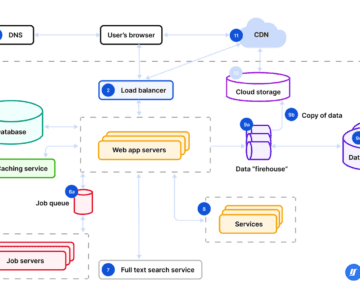Global Healthcare CRM Market:
According to recent statistics, the global healthcare CRM market is currently valued at $17.9 billion but is expected to gain $30.7 billion by 2030. One of the reasons for this rapid growth rate is the increasing demand for easily accessible data, as well as the increasingly streamlined business processes across multiple sectors, including healthcare.
Healthcare customer relationship management (CRM) solutions allow medical organizations to improve their overall performance. They do this by creating quantifiable relationships between providers, patients, team members, and client referrals. This translates into healthcare businesses enjoying reduced costs, an improved client experience, as well as optimized medical services.
In this blog, we will delve into the basics of healthcare CRM development, including its features and key benefits. We’ll also take a closer look at the healthcare CRM development process at larges.
 Healthcare CRM Market Overview
Healthcare CRM Market Overview
The rising demand for structured data and automation in healthcare is expected to continue fueling market growth. It is currently slated at a compound annual growth rate (CAGR) of 7.7%. You can see the effects of this in the increase in technological advancements in the sector. Features like AI integration in CRM solutions continue to be introduced in an effort to further improve software effectiveness and drive much wider adoption and digitalization. Another factor to take into account is the increasing awareness of the need to improve customer experience across all industries, including healthcare — further fueling the adoption of CRM in healthcare.
What is a CRM in Healthcare?
Healthcare CRM systems are designed to help you automate tedious and repetitive administrative tasks such as appointment scheduling and check-up reminders, giving your healthcare facility staff more time to focus on patient care and business-critical activities. CRM software is also instrumental in bettering coordination among healthcare teams and allowing for better collaboration and information sharing. This, in turn, leads to better outcomes and higher levels of patient satisfaction.
When it comes to development, designing healthcare CRM systems involves implementing software solutions that are tailored to the specific needs of certain medical institutions. This involves creating software that can track medical histories, manage appointments, streamline patient interactions, and enhance overall patient satisfaction, among others. If you are a medical service provider, CRM systems also offer a centralized platform to efficiently handle patient data, appointments, and communications.
Healthcare CRM software seeks to improve your patients’ experiences through a variety of features such as appointment push notifications, recording conversations, or even determining patients’ preferred locations and appointment times. CRMs can also automate and personalize ad campaigns to reach your patients and clients with personalized communications. These can be anything from birthday cards to customized emails about follow-up checkups or medication reminders. The software can also manage referrals. It does this by storing information about specialists, facilities, and the like — enabling easy patient referrals to the appropriate people.
Common Types of Healthcare:
When it comes to development, designing healthcare CRM systems involves implementing software solutions that are tailored to the specific needs of certain medical institutions. This involves creating software that can track medical histories, manage appointments, streamline patient interactions, and enhance overall patient satisfaction, among others. If you are a medical service provider, CRM systems also offer a centralized platform to efficiently handle patient data, appointments, and communications.


















